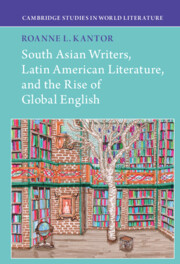Book contents
- South Asian Writers, Latin American Literature, and the Rise of Global English
- Cambridge Studies in World Literature
- South Asian Writers, Latin American Literature, and the Rise of Global English
- Copyright page
- Dedication
- Contents
- Figures
- Acknowledgments
- Introduction
- Chapter 1 Transmigrant
- Chapter 2 Stranger
- Chapter 3 Displacee
- Chapter 4 Pilgrim
- Chapter 5 Revenant
- Epilogue
- Notes
- References
- Index
Chapter 2 - Stranger
Paz’s Peregrinations through Indian Poetry
Published online by Cambridge University Press: 17 February 2022
- South Asian Writers, Latin American Literature, and the Rise of Global English
- Cambridge Studies in World Literature
- South Asian Writers, Latin American Literature, and the Rise of Global English
- Copyright page
- Dedication
- Contents
- Figures
- Acknowledgments
- Introduction
- Chapter 1 Transmigrant
- Chapter 2 Stranger
- Chapter 3 Displacee
- Chapter 4 Pilgrim
- Chapter 5 Revenant
- Epilogue
- Notes
- References
- Index
Summary
This chapter turns to the curatorial role of authors on the countershelf, tracing the impact of Octavio Paz’s sojourn as Mexican ambassador to India (1962–1968) on Indian poets and artists in the little magazine scene of the 1960s and 1970s, including Arvind Krishna Mehrotra, Geeta Kapur, and Jagdish Swaminathan. While Neruda often formed the image of the countershelf for South Asian authors, Paz was the nearly invisible engine through which that imaginary consolidated. Paz’s sensibility of “strangerhood” reflected his growing interest in the baroque, a form which emerged to aestheticize the rapidly and radically changing concept of the world in the era of colonial expansion. This same strategy was taken up by several creators of Indian little magazines, among whom Paz helped to establish a very particular idea of world-literary friendship: not an increasingly unified and easily digestible singular style but a series of intentionally disorienting enigmas. Both route through Latin American literature of the 1960s, but the 1970s Indian poets set a very different course for global English, one that the rise of the novelists in the 1980s dramatically interrupted and then, essentially, cut off.
Keywords
- Type
- Chapter
- Information
- Publisher: Cambridge University PressPrint publication year: 2022

